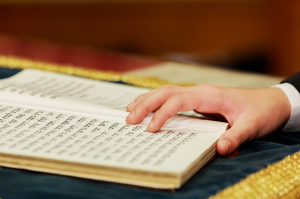Yes, it is good to feel that we are being watched, especially when the One watching is our loving G-d who not only watches us but watches over us. After all, G-d is not a tyrant out to punish us and cause us suffering. He is a loving Father who wants us only to share His goodness and to enable us to attain true joy in this world and the next.
Consider your GPS: You are constantly being watched “from above” as you drive, something you chose, in order to get to your destination. If you make a wrong turn, it immediately lets you know and tells you how to get back on track.
The Torah is G-d’s GPS system, something our people chose at Sinai over 3000 years ago, and it has kept us on track throughout the most complicated roads known to history.
In answer to your question, yes, it is a good thing to always try to do the right thing in our lives. It is good to serve G-d through prayer and observance of His commandments, and it is good to help others — which is also the service of G-d, by giving, sharing, with acts of loving kindness and charity.
I agree with you that God does not want us to live in a state of anxiety and tension. That is not at all what the mitzvah system causes. On the contrary, those who truly live by that system find it a source of deep peace and contentmentt in their lives.
You might ask, don’t observant Jews worry about what might happen to them if they fail to perform a commandment in just the right way? Obviously, a believing Jew makes every effort to perform the commandments and to fulfill them in just the right way. But fear of punishment is not uppermost in one’s mind. In practice, what is uppermost is the desire to fulfill the will of G-d with love.
The greatest reward is the closeness to G-d that is attained by the performance of a mitzvah. The greatest punishment is the distance that is created between us and G-d when we violate His laws. This closeness or distance are an automatic cause and effect, built into every commandment.
Paradoxically, only under such a system can there be true joy and pleasure. Look at it objectively, and you will see that in Judaism, no physical pleasures are removed from us. We are encouraged to marry and to raise children. Eating and drinking delicious foods and drinks are not proscribed and even encouraged, especially on the Sabbath and holidays. Social contact is encouraged and in fact enhanced by joining together as a community. Nothing is withheld from us. Granted, we are not permitted unbridled, undisciplined pleasure. Everything has its place and its time. But the enjoyment of all the above is enhanced when it’s part of a system which elevates these pleasures to the level of eternity.
Further, Judaism introduces us to a realm of spiritual pleasure that would otherwise be unknown. The end result of it all is not ephemeral or diminished pleasure, but intensely heightened pleasure. The Torah is actually the Book that guides us through these pleasures, because G-d, in fact, created the world for our benefit and pleasure.
Sincerely,
Rabbi Yerachmiel Fried

